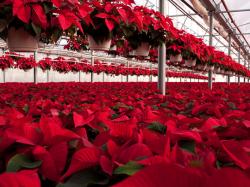Poinsettia Production Is Big Business For North Carolina
December 20, 2013 | 2 min to read

RALEIGH – The bright red or frosty white leaves of a poinsettia are common decorations this time of year, and the six-week period leading up to Christmas is the busiest season for poinsettia growers. Last year in North Carolina, 4.4 million poinsettias were sold, generating $17.6 million in sales.Red and white poinsettia plants
“North Carolina not only ranks second in the country in Christmas tree sales, we also rank second in poinsettia sales,” said Agriculture Commissioner Steve Troxler. “Many people in our state and nationally celebrate the season surrounded by decorations grown right here in North Carolina.”
Poinsettias are grown in a greenhouse at temperatures above 60 degrees. Christmas starts early in the greenhouse, as poinsettias to be sold at Christmas are grown from cuttings that began in the summer months.
John Dole, horticultural science professor at N.C. State University, offers the following advice for picking out a perfect poinsettia: “Choose a poinsettia that has fresh-looking bracts, which are the modified colored leaves. Look for small flowers in the center of the plant, if these have fallen off it could indicate it’s an older poinsettia. Finally, red poinsettias should have healthy, dark green foliage, and the white or pink poinsettias leaves should be a lighter green.”
Poinsettias are highly sensitive to cold weather. Transport them in a large, roomy shopping bag to protect them from temperatures below 50 degrees. At home, water your poinsettia when the soil is dry. Cold temperatures and overwatering will cause your plant to wilt. Wilted plants will drop their leaves quicker, and once a poinsettia wilts, it’s too late to stop the damage, Dole said.
A common myth is that poinsettia’s are poisonous to people and animals. “We have to spend time every year telling people that this is just not true,” Dole said. While ornamental plants, such as poinsettias, are not intended for human or animal consumption, they are not considered poisonous.
For a list of nurseries and greenhouses that sell poinsettias, visit www.ncfarmfresh.com.
Source: North Carolina Department of Agriculture & Consumer Services
